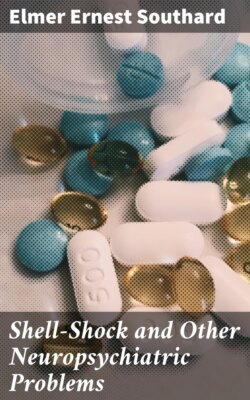Читать книгу Shell-Shock and Other Neuropsychiatric Problems - Elmer Ernest Southard - Страница 92
На сайте Литреса книга снята с продажи.
ОглавлениеPathological intoxication.
Case 86. (Boucherot, 1915–6.)
A Territorial infantryman, aged 37, was in the habit of drinking a good deal without getting drunk, and at the front drank a good deal of bad brandy. He had just taken a considerable quantity when his regiment got the order to charge. The charge was hardly over when the man became greatly excited and hallucinated. He thought he was surrounded by Germans and tried to transfix his comrades with the bayonet. Howling and struggling he was carried to the rear.
He was soon brought to the asylum at Fleury after howling all night and seeing the Boches and animals fighting among themselves. His hands and tongue were tremulous and there were cramps in the calves of his legs. On the 6th he expressed astonishment to find himself in hospital and was found to have but slight memory of what had happened. He remembered, however, that he had tried to kill his comrades. With the deprivation of alcohol he became rapidly normal and was sent back to the dépôt in a few days.
Re alcoholism under army conditions, Lépine remarks that alcohol has played in this war a rôle analogous to that of malaria in the epidemiology of some countries. Many of the victims are, to start with, unbalanced subjects and détraqués who are hereditary alcoholics. Alcoholism, according to Lépine, dominates the pathology of the interior and has a marked bearing upon conditions at the front. In fact, alcoholism would have been disastrous in France had not measures been taken against it; measures still insufficient (1917). More than one-third of 6000 cases studied by Lépine during three years have shown alcohol as a sole or, at all events, principal cause of the difficulty. It would be within reason to state, according to Lépine, that if we throw in cases in which alcoholism was a partial factor, more than half, or even more than two-thirds, of the mental cases had been strongly influenced by alcohol. Lépine thinks there may be effects like those of anaphylaxis. Certainly, the startling and sudden effects in so-called pathological intoxication, as in Case 86, suggest the critical and vehement effects seen in the sensitized anaphylactic subject.
Chart 4
PHASES OF WAR PSYCHIATRY IN FRANCE
| I. | Antebellum phase of Psychiatric Neglect: Groundless fear that recruiting would be disorganized by psychiatric sifting processes. |
| II. | Phase of Alcoholism of Mobilization: Hospitals unprepared. |
| III. | Phase of the Marne: Alcoholism restrained by law; psychoses few; psychiatrists optimistic. |
| IV. | Phase of Trench Warfare: Overemotionality; and of High Explosives (January, 1915); now psychiatric services were systematically established along evacuation lines. |
| V. | Phase of Systematic War Psychiatry: Filterwise system of management (a) near trenches, (b) in main body of army, (c) on evacuation lines, (d) special hospitals. |
Chiefly from data of Chavigny, 1915.
